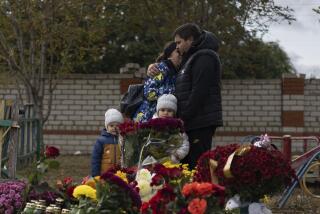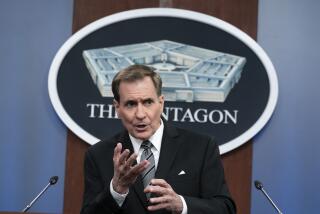U.N. Report on Air Strikes in Bosnia Due : Balkans: Boutros-Ghali orders the study. NATO has threatened to use air power, but issue remains confused.
- Share via
WASHINGTON — In an atmosphere of doubt and ambiguity, U.N. Secretary General Boutros Boutros-Ghali on Wednesday ordered a top aide to prepare a report in the next five days on the possible use of NATO air power to break rebel Serb strangleholds in Bosnia-Herzegovina.
Boutros-Ghali’s decision on whether to authorize such air strikes--and the procedure for ordering each one--apparently will be made after the report is taken up at a high-level U.N. meeting in Geneva on Monday.
The secretary general ordered Yasushi Akashi of Japan, his highest-ranking civilian official in the Balkans, to make the report after this week’s NATO threat to use air power to relieve Canadian peacekeepers in Srebrenica, open the Tuzla airport for humanitarian supplies and stop the bombardment of Sarajevo.
The warning came at the end of a summit of the North Atlantic Treaty Organization in Brussels.
The whole issue has been clouded, however, by widespread skepticism over NATO’s resolve and confusion about how any order would be carried out.
Under a Security Council resolution passed last June, the final authority for ordering air strikes appears to lie with Boutros-Ghali. But there is a good deal of ambiguity about the procedure.
To complicate matters further, the secretary general reportedly has been angered by the attitude and remarks of Gen. Jean Cot of France, commander of U.N. forces in the former Yugoslav federation.
Cot has argued in interviews that the military command--not a civilian such as the secretary general--should make the final decision on any air strikes.
His comments, according to Reuters news agency, prompted Boutros-Ghali, long wary of any use of air power in Bosnia, to send Cot a letter of reprimand.
In Geneva, U.N. spokeswoman Therese Gastaut said that Akashi, the secretary general’s special representative for the former Yugoslav federation, will present his report to Boutros-Ghali at a Monday meeting that will be attended as well by Thorvald Stoltenberg of Norway, the co-chairman of the Bosnian peace conference, and by Marrack Goulding, the undersecretary general for political affairs.
In its June resolution, the Security Council said that NATO, “under the authority of the Security Council and subject to close coordination with the secretary general” and the U.N. peacekeeping force, “may take . . . all necessary measures, through the use of air power” to support the peacekeepers in their mission.
On the basis of this resolution, Boutros-Ghali later told the council that “the first decision to initiate the use of air resources in this context will be taken by the secretary general in consultation with the members of the Security Council.”
It has never been clear whether Boutros-Ghali intended to simply inform the council of his decision or to seek its approval.
This presumably will be cleared up after the Monday meeting.
More to Read
Sign up for Essential California
The most important California stories and recommendations in your inbox every morning.
You may occasionally receive promotional content from the Los Angeles Times.













